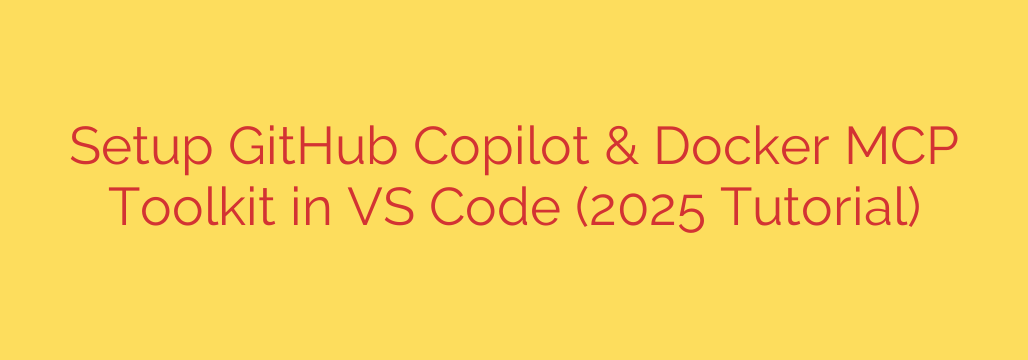
Setting up your development environment efficiently is crucial for maximizing productivity and staying ahead in 2025. For developers working with Visual Studio Code, integrating powerful tools like GitHub Copilot and specialized toolkits like the Docker MCP Toolkit can streamline workflows significantly. This guide walks through the essential steps to get these tools configured within your VS Code instance.
First, ensure you have Visual Studio Code installed on your system. This serves as the foundation for integrating these extensions.
Next, let’s tackle GitHub Copilot. This AI-powered code assistant is a game-changer for writing code faster and reducing boilerplate. Open the Extensions view in VS Code (Ctrl+Shift+X or Cmd+Shift+X). Search for “GitHub Copilot” and click Install. Once installed, you’ll likely need to authenticate with your GitHub account to activate your subscription or trial. Follow the prompts to authorize VS Code. After successful authorization, the Copilot icon should appear in the status bar, indicating it’s active and ready to assist you by suggesting code as you type or providing inline code completions based on comments and context.
Now, let’s integrate Docker capabilities. Docker is fundamental for containerization, ensuring your applications run consistently across different environments. In the VS Code Extensions view, search for “Docker”. Install the official Docker extension. This extension provides a rich interface within VS Code to manage your Docker images, containers, volumes, and networks. You can view logs, attach to running containers, execute commands, and even build images directly from your Dockerfile within the IDE. Ensure you have Docker Desktop (or your preferred Docker engine) running on your machine for the extension to function correctly.
Finally, setting up the Docker MCP Toolkit within VS Code, if available as an extension, follows a similar pattern. Search for “MCP Toolkit” or the specific name provided for the toolkit’s VS Code integration in the Extensions view. Install the relevant extension. The MCP Toolkit is designed to simplify specific tasks related to managing and deploying applications often involved in Modern Cloud Platforms (MCP) environments using Docker. Its integration in VS Code typically provides commands, snippets, or views tailored to these tasks, making complex operations more accessible directly within your coding environment. Using this toolkit alongside the standard Docker extension creates a powerful synergy for cloud-native development workflows.
By completing these steps, you create a robust development environment in VS Code, leveraging the power of AI assistance from GitHub Copilot, comprehensive container management with the Docker extension, and specialized tooling from the Docker MCP Toolkit. This setup is engineered for maximum efficiency and performance in modern development practices, ensuring you are well-equipped for the challenges of 2025 and beyond.
Source: https://collabnix.com/github-copilot-vs-code-setup-docker-mcp-toolkit-tutorial-2025/








